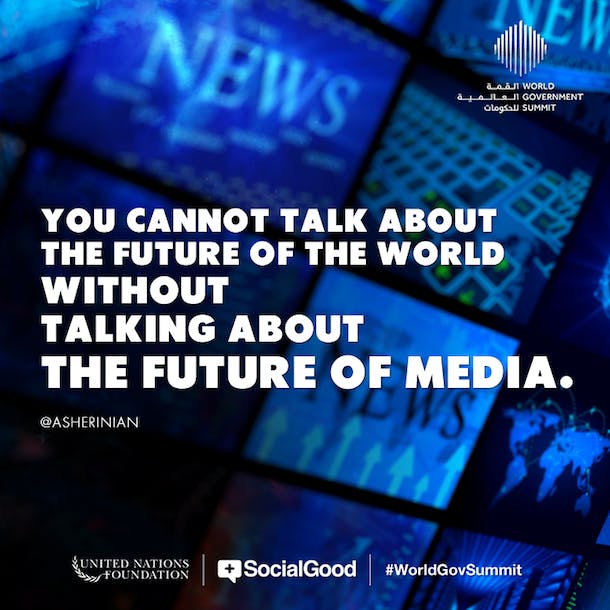
I get to talk with journalists and media executives every day. It’s one of the best parts of my job. As a communicator who is focused on raising awareness of global issues – both problems and solutions – these women and men are at the frontlines of a world in transition. The media is an essential actor in creating healthy societies – spreading knowledge, shining a light on urgent issues, engaging citizens in the world, and holding governments and other institutions accountable for the promises they make.
Yet today, the media is facing unprecedented challenges: tightening budgets, increased competition, 24/7 news cycles, social media outlets that spread misinformation, the proliferation of fake news, and a global erosion in trust by the public.
The bottom line: We cannot talk about the future of the world without talking about the future of media.
The world counts on a strong journalism sector to connect people to the world around them, to hold leaders accountable for delivering on their promises for change, and to challenge them about why and how those promises align with the values of their nations and the aspirations of their constituents. These promises might be pledges made at the local or global level, including the Sustainable Development Goals. On the sidelines of the World Government Summit, a premier summit on how governments can innovate to solve humanity’s biggest challenges, the United Nations Foundation brought together some of the brightest minds from media, business, and the UN to discuss how we can work together to support media.
Through the Foundation’s Global Bureau project, we continue to partner with journalists to enhance and expand the conversation around sustainable development. This convening on media was a chance to think through how we can build on this progress moving forward. Here are five key themes we heard during the conversation:
Give context. In an era of constant crises and breaking news, people are hungry for credible journalism that provides context, understanding, and the larger picture around complicated issues. Journalists know that they are among the best poised to help provide this perspective for readers around the world.
Build capacity. We need to invest in strengthening the capacity of journalists to do their jobs well, including mentorship and training for reporters, support for quality, in-depth reporting, and budgets to travel and report from around the world. The media executives, journalists, policymakers, and civil society leaders we have met with all agree: When you offer training experiences and support for media, you are supporting society.
Go deep, go long. To understand complex issues and to uncover hidden challenges, it is important to support long-form, investigative reporting that dives deep. This can take time and money, and the outcome may not be clear from the start, but this kind of reporting is something journalists are uniquely qualified to do and something that is desperately needed to address challenges, get the facts straight, and hold leaders accountable.
Share stories, not just stats. Data provides essential information about global issues, but data alone is not always enough to interest people in them. Journalists know how to tell stories and can put a human face alongside the data to explain and engage. Finding ways to marry big data with the biggest stories of today is the winning combination for good content.
Partner for a new era. Partnership and collaboration provide new opportunities to take journalism further into the future. For example, reporters from across regions can partner to share local perspectives on global issues. The media and non-governmental organizations working on the ground can partner to tell the human story of people affected by crises and disasters. And organizations from other sectors can work together to help provide journalists with greater resources to do their jobs.
There are no easy answers, but journalists aren’t afraid to ask the tough questions. They are taking on questions about the future of their tradecraft and industry as they take on the biggest issues of our time. It’s a complicated world and a complicated time era for the media’s role in it. But one thing is clear: The work of journalists is more important than ever, and we all have a stake in the future of media. Let’s collaborate to get that story right.



 View All Blog Posts
View All Blog Posts